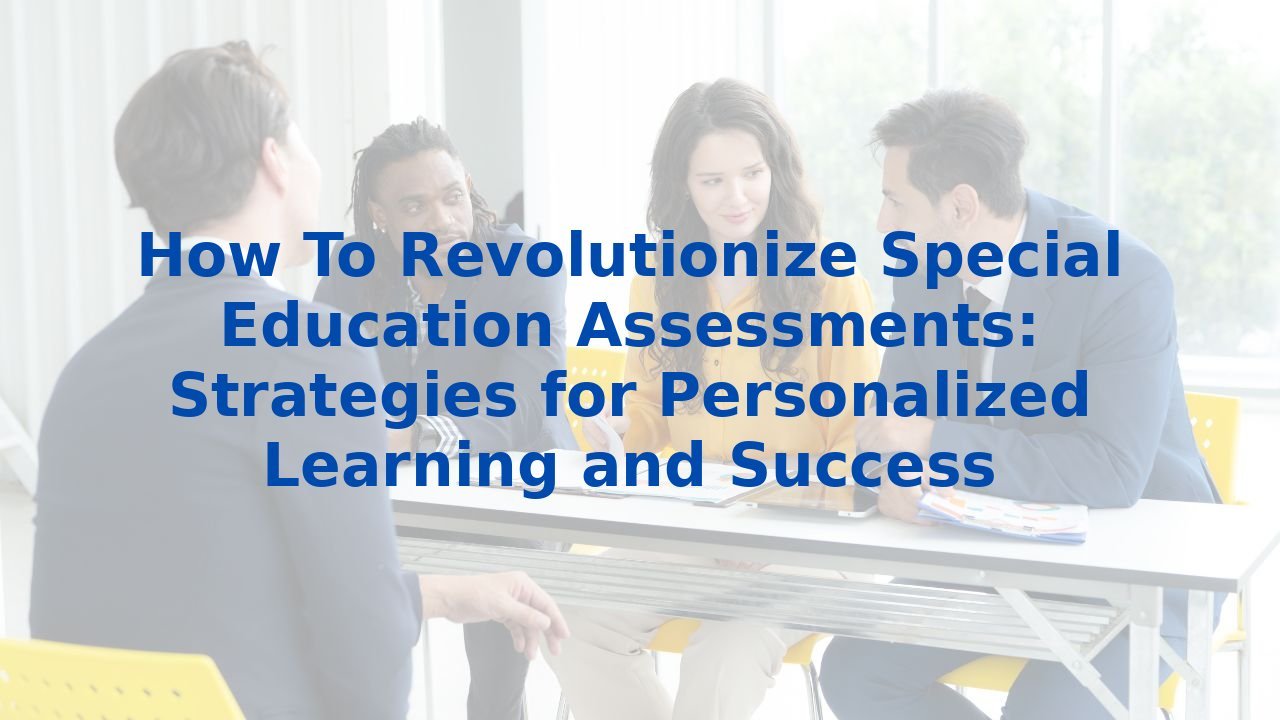How To Revolutionize Special Education Assessments: Strategies for Personalized Learning and Success
How To Revolutionize Special Education Assessments: Strategies for Personalized Learning and Success
Introduction
In the world of special education, the ability to accurately assess student progress is not just a necessity; it's foundational. Traditional assessment methods often fail to encapsulate the true spectrum of individual student needs, leading to gaps in understanding and support. Enter AI—a transformative force with the potential to reshape the landscape of special education assessments. In this article, we will explore how AI can enhance assessments, align them with individual needs, and provide a path toward personalized learning experiences.
Aligning Assessments with Individual Needs
Standardized tests have long been the norm in educational assessments, but they often miss the mark for students with unique learning requirements. With AI, we can craft tailored assessments that reflect each student's learning style and abilities. Imagine assessments that adjust in real-time—adaptive tests that recalibrate their difficulty based on student performance. Such personalized experiences ensure that each challenge remains engaging yet attainable, paving the way for true progress.
Utilizing Various Assessment Methods
AI’s potential doesn't stop at personalized assessments; it enhances the types of assessments used. Rather than leaning solely on traditional exams, educators can incorporate project-based evaluations, observations, and self-assessments, all significantly bolstered by AI tools. By using diverse assessment methods, educators can weave a more complete narrative of student performance, revealing strengths and challenges that standardized testing might overlook. This holistic approach not only differentiates instruction but also elevates the overall educational experience.
Interpreting Data to Personalize Learning
Data holds the power to inform and transform educational strategies. However, analyzing vast amounts of assessment data can be daunting. This is where AI shines—by employing algorithms to move beyond surface-level observations and spot intricate patterns that may elude the human eye. Through insightful data analysis, educators can set Individualized Education Program (IEP) goals and develop targeted interventions, ensuring that every student's unique path is nurtured with precision.
Benefits of AI in Special Education
The incorporation of AI in special education assessments extends far beyond improved assessments; it brings forth a range of benefits:
- Enhanced Efficiency: AI automates time-consuming tasks such as grading and data analysis. As a result, educators have the luxury of channeling their energy into teaching and support, which is where their impact truly lies.
- Personalized Learning: AI's provision of tailored assessments and interventions fosters a more inclusive environment, ensuring that all students feel seen and supported.
- Improved Accuracy: By minimizing human error in grading and interpretation, AI bolsters the reliability of assessments. This newfound precision is crucial in ensuring students receive the appropriate support they require.
Training Employees for AI
To harness the full potential of AI in education, it’s imperative to invest in employee training. Educators must develop a robust AI literacy that encompasses an understanding of AI capabilities and limitations. This training should cover how to formulate effective questions for AI tools, assess AI-generated content critically, and understand key ethical considerations, including data privacy and ownership. With the right training, educators can navigate the complexities of AI responsibly, empowering them to use these tools in a way that respects and enhances the educational experience.
Conclusion
The integration of AI into special education assessments represents a transformative leap forward, making evaluations more personalized, efficient, and accurate. By embracing AI tools that create adaptive assessments, leverage diverse evaluation methods, and empower data interpretation, educators can build a richer, more supportive learning environment. As we advance, remaining informed about AI's evolving capabilities ensures educators are well-equipped to harness this technology's immense power for the betterment of student progress and instructional strategies.
For organizations looking to deepen their understanding and application of AI in education, investing in comprehensive training programs tailored to your staff can lay the groundwork for success. It's not just about incorporating technology; it's about empowering educators to reshape the future of education, one assessment at a time.



